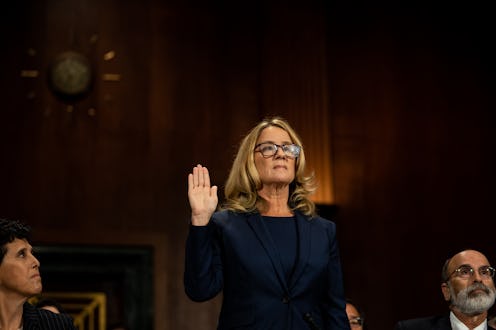News
Read Kamala Harris’ Touching Tribute To Christine Blasey Ford For The ‘TIME’ 100 List

Among those on the 2019 TIME 100 list of the most influential people in the world is Dr. Christine Blasey Ford, the woman who spoke openly about her experience of sexual assault in front of not only the Senate Judiciary Committee last September but the entire country. Now, Sen. Kamala Harris is honoring Blasey Ford in TIME by writing her entry on the list.
"Her story, spoken while holding back tears, shook Washington and the country," Harris, who is running to be the Democratic nominee for president in 2020, writes. "Her courage, in the face of those who wished to silence her, galvanized Americans. And her unfathomable sacrifice, out of a sense of civic duty, shined a spotlight on the way we treat survivors of sexual violence."
Harris goes on to say that Blasey Ford didn't want to become a household name — rather she "risked everything to send a warning in a moment of grave consequence." Blasey Ford is a professor of psychology at Palo Alto University and works as a research psychologist at the Stanford University School of Medicine.
"At her core, she is a teacher," Harris writes. "And through her courage, she forced the country to reckon with an issue that has too often been ignored and kept in the dark."
Blasey Ford is one of many influential women on the list, including House Speaker Nancy Pelosi, former First Lady Michelle Obama, and New Zealand Prime Minister Jacinda Ardern. Pelosi's entry was written by Hillary Clinton, Obama's by Beyoncé, and Ardern's by London Mayor Sadiq Khan, who lauded the prime minister's response to the shootings at Christchurch mosques.
Of all the people — and women — who made the list, Blasey Ford may be among the most influential in the past year, new data would suggest. The Cut reported that the Kavanaugh hearing and Blasey Ford's testimony have seemingly permanently changed how both men and women view sexual assault in the United States.
The underlying numbers were from PerryUndem, a nonpartisan public opinion research firm, which through a survey found that over time the American public has grown to believe that Blasey Ford was telling the truth by a margin of 16 percentage points — up from just a seven-point margin in late September when she took the stand.
When analyzing how this then translates to electoral politics, PerryUndem's report suggested that it helped Democrats in the 2018 midterms because after the hearings voters thought more about how men have more power than women in government. That included four in 10 men and one in four Republican women, whose long-term voting behavior could shift, the report suggests.
Long-term societal shifts could come about as a result, too, the report suggested. Some 37% of respondents said that they talked to their children about consent and sexual assault following the hearings.
One downside — at least in the short term — is that the hearings may have made Republican men more sexist, PerryUndem's analysis found. The number of Republican men who think that "most women interpret innocent remarks or acts as being sexist" skyrocketed from 47% to 68%. The report also notes that less than half of Republican men now view sexism as a problem in the country, down from 63% in 2017.
Without a doubt, though, Blasey Ford — and what Harris calls her "courage" and "sense of civic duty" that led her to testify — have influenced the entire country.